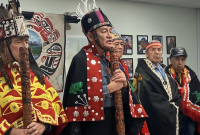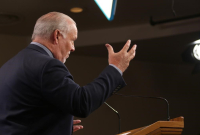Support strong Canadian climate journalism for 2025
The president of a company building a natural gas pipeline across northern British Columbia is renewing a request to meet with the hereditary clan chiefs of a First Nation who say the project has no authority without their consent.
Coastal GasLink president David Pfeiffer said in a letter Tuesday to Na'moks, who leads one of five clans of the Wet'suwet'en Nation, that although the B.C. Supreme Court has granted the company an injunction, it would prefer to resolve the dispute through discussion.
"Our preference continues to be resolution of issues through meaningful dialogue," the letter said.
But Na'moks, who also goes by John Ridsdale, said in an interview that the chiefs won't meet with industry representatives, only "decision makers" in the provincial and federal governments and RCMP leadership.
The statements suggest a continued impasse between the chiefs and the company behind a 670-kilometre pipeline from Chetwynd in northeastern B.C. to LNG Canada's export terminal in Kitimat.
Coastal GasLink has signed agreements with all 20 elected First Nations along the pipeline route, including elected Wet'suwet'en councils that have authority on reserves, but the hereditary clan chiefs say no one is allowed on their broader 22,000-square kilometre territory without their consent.
The hereditary chiefs point to the 1997 Delgamuukw' decision in the Supreme Court of Canada recognizing the existence of Aboriginal title, however, the judge who granted the injunction says in her decision that the Wet'suwet'en title claim has never been resolved through litigation or negotiation.
On Monday, RCMP officers set up a checkpoint along a logging road leading to a Coastal GasLink work site. Between the checkpoint and the work site, supporters of the hereditary chiefs have established three camps and police say trees have been felled across the road, blocking access.
Premier John Horgan said Monday the $6.2-billion pipeline is vital to the region's economic future and will be built despite the Wet'suwet'en chiefs' objections, adding that the courts have ruled in favour of the project.
Pfeiffer said in the letter to Na'moks that Horgan's comments reinforce the need to collaborate and work together to solve their issues, in addition to and separate from the hereditary chiefs' talks with the provincial government.
He suggested Friday as a date to meet and thanked the chiefs for their support in helping the company winterize its worker accommodation site.
Na'moks said the chiefs were surprised that the RCMP established a checkpoint after they met with RCMP deputy commissioner Jennifer Strachan last week, adding that they have not met with her again.
"Things are quite tense," Na'moks said Tuesday, promising that pipeline opponents will remain peaceful.
He said some members of the First Nation were turned away from the checkpoint Monday. The RCMP said in a news release they would allow accredited media, hereditary and elected chiefs, and anyone delivering supplies to pass through.
The RCMP could not immediately be reached for comment on Tuesday.
The Canadian Association of Journalists called for free media access to the area, noting that the RCMP prohibited reporters and photographers from passing through an exclusion zone last year, "making it impossible to provide details on a police operation that was very much in the public interest."
This report by The Canadian Press was first published Jan. 14, 2020.





Comments
WE STAND WITH THE WET'SUWET'EN!
The way we settlers are raising the temperature and gobbling up resources, we may well depend on them teaching us how to live a sustainable life in the future!
Not "settlers", but "unsettlers".
I come from a long line of them. I call us "newcomers". If an adjective is needed, then I call my paternal line "early newcomers", in the 1600s, and my maternal line "recent newcomers", the early 1900s.
That's splitting hairs, however, in the face of peoples who have been here for millennia. Those who have just arrived in a new place to them understand that it will take a few years to figure out where and how they fit best. This is a false assumption and ignorant, however, because it actually takes decades and even centuries to read the nature of a place and work out ways to live in harmony with it. That's why "settlers" is an incorrect and misleading term, because the unsettling goes on and on, with little evidence of even the most well-intended newcomers -- me included -- doing anything different than the forebears who imposed their will and grand plans on the land and its indigenous peoples.
Recognizing this is, at least, a start to conversations about what "settling" should really mean and be.